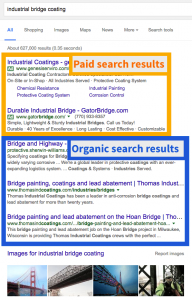Companies outside of the industrial sector have been using online marketing to drive brand awareness—and more importantly, sales—for quite some time. These opportunities are, as some of you may know, just as beneficial to industrial companies for finding new leads and growing sales.
Not managing an online presence for your company is neglecting the primary resource potential buyers are using to research product specs, services, standards, and suppliers. According to IHS Engineering360’s Report on Digital Media use in the Industrial Sector, 89% of technical professionals use generic search engines (think Google or Yahoo) as a source of information for work.
If you’re an industrial marketer and you haven’t transitioned your focus to online efforts, now is your time. Getting started with marketing on search engines (ie. search marketing) will help with finding those leads and customers, via SEO and PPC.
[scode sid=’7185′]
Defining the acronyms
The end goal of search marketing is getting your company and your brand on the search engine results pages (SERPs) so that potential customers already seeking your product or service can find you. The two ways to achieve that are search engine optimization (SEO) and pay-per-click (PPC).
 SEO, also called ‘Organic Search,’ is focused on improving your website’s content so that search engines deem your site relevant and valuable to those potential customers. Each search engine has its own ‘spiders’ that crawl websites and their code to identify if the site’s contents are relevant to the keywords a user searches with. The other option, PPC, also referred to as ‘Paid Search,’ is a pay-to-play option that gets your company right in front of that product engineer or operations manager via word-based ads.
SEO, also called ‘Organic Search,’ is focused on improving your website’s content so that search engines deem your site relevant and valuable to those potential customers. Each search engine has its own ‘spiders’ that crawl websites and their code to identify if the site’s contents are relevant to the keywords a user searches with. The other option, PPC, also referred to as ‘Paid Search,’ is a pay-to-play option that gets your company right in front of that product engineer or operations manager via word-based ads.
In each case, it’s about knowing what keywords or phrases that audience is using to search for your product. To the left is an example of a Google SERP, with the paid search and organic search both present.
How do they differ
Choosing where to focus your efforts between SEO and PPC depends on you and your company’s marketing goals. Both will help build your brand awareness on search engines and drive leads, but each in different ways.
SEO is about building long term value as a thought leader and providing guidance to potential customers before they’re even ready to request a quote. It is about optimizing one’s website so that both search engine’s crawlers and site visitors find content relevant to their question. It is not an easy process, nor guaranteed, but yields greater brand equity and enables you to begin a conversation with your customers before they know they’re ready to buy.
In contrast, PPC is quick and versatile to enable you to hit the ground running with custom ads, test different ads to find the best options, or change things up to stay aligned with your changing business. PPC is exactly how it sounds; spending is directly connected to the number of clicks your ads receive. This double-edged sword means that you get what you pay for, and you also lose that site traffic as soon as the spending stops.
Which is for my business
If your company seeks a long term, equity-driven strategy to grow business online, SEO is the clear solution to provide content that answers your audience’s questions. Getting the most out of this strategy involves writing to appeal to site visitors and optimizing technical aspects of your site to appeal to search engines. The result is a larger, more relevant audience to educate about your product or services that lasts long after the content is published.
On the other hand, where SEO takes time to see ROI, PPC can attract new leads the day it starts. If you’re looking to understand your leads better, testing with PPC is also the better option for its versatility. In the end, PPC will offer results that more closely tie spending and performance.
While organic and paid search have very opposing values, they are not mutually exclusive. PPC and SEO also complement each other. While growing the long term investment of SEO, PPC drives the immediate attention to your site. Additionally, while PPC tests what new concepts drive traffic to your site, SEO focuses on what already works.
Conclusion
Search engines are the primary resource for professionals across manufacturing, construction, distribution, and industrial services to seek solutions to their businesses’ problems. Industrial marketers are at a point where online marketing is status quo for the industry. Whether the focus is on SEO, PPC, or both, there is valuable real estate that competitors already vie for. The newbies must now adapt to earn their share of it.
Scott Ellyson, CEO of East West Manufacturing, brings decades of global manufacturing and supply chain leadership to the conversation. In this episode, he shares practical insights on scaling operations, navigating complexity, and building resilient manufacturing networks in an increasingly connected world.